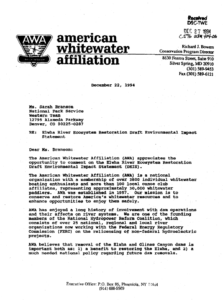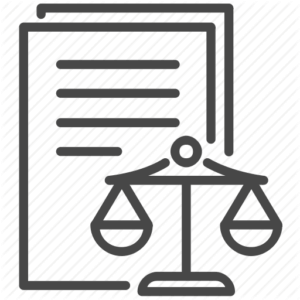CSPA Develops and Supports Changes to Hydropower Licensing
CSPA has played a strong role over the last 12 months in developing and negotiating a package of proposed reforms to the Federal Power Act. The package will, if implemented, change a multitude of on-the-ground aspects of how the Federal Energy Regulatory Commission (FERC) licenses hydroelectric projects. The package, with a short summary, was transmitted to committee leads in Congress in early April 2022.
CSPA’s Chris Shutes was co-chair of a working group and one of the most active members of a “drafting team” that developed the package. The drafting team was composed of representatives from the hydropower industry, Indian tribes, and non-governmental organizations (NGO’s). The working group came about as a result of the “Uncommon Dialogue on Hydropower.”
In the fall of 2020, CSPA began developing a series of problem statements concerning hydropower licensing. CSPA wrote up and presented these issues to fellow members of the Hydropower Reform Coalition in late 2020. The Coalition chose CSPA to be one of the NGO co-chairs in a working group with tribes and industry, which completed the package in March 2022 following forty-plus negotiating sessions over 2021 and early 2022. The recommended changes consist of word-by-word line edits and additions to the Federal Power Act.
Some of the basic principles in negotiating the package were:
- Changes are limited to the Federal Power Act, not other laws.
- Changes should not alter the authorities of FERC or other agencies, or shift the balance of authorities among them.
- The exception on shifting authorities is that federally recognized Indian tribes should have explicit authorities to act for themselves, rather than having the Department of Interior act for them.
- Maintain consistency with case law.
- Rather than questioning stated interests of negotiating parties, seek agreement on changes that meet mutual interests or move on.
The package if enacted would increase opportunities for advocates to use the hydropower licensing process to improve the conditions of rivers and fish. Among the improvements are:
- A requirement that FERC develop new rules for “license surrender” that include timelines and that allow the public to recommend early in the process what should happen when a hydro project ceases to operate. This would offer river and fishery advocates a major opportunity to get obsolete dams and other infrastructure out of rivers in years, not decades.
- A requirement for FERC to analyze and consider mitigating the ongoing and reasonably foreseeable future effects of a hydropower project in relicensing. Too often, FERC has accepted the effects of a dam or other infrastructure as past actions where the damage was done. A new definition would make FERC address ongoing effects, including what would be different if the dam and hydropower project didn’t exist. It would also require FERC to look forward over the 30-50 years of a new license.
- A requirement for FERC to analyze project effects under a changing climate. Till now, FERC just said no to climate change because it was too difficult or “speculative.” FERC would have to adopt methods for addressing climate change and hold periodic conferences to keep current on climate science.
- Requirements that give federally recognized Indian tribes the right to issue mandatory conditions in hydropower licenses for projects that occupy Indian reservations. Related requirements would give federally recognized tribes that same standing as fisheries agencies when projects affect treaty rights that relate to fish and wildlife.
- A requirement for “all models, including data and other modeling inputs and outputs, to be reasonably available for evaluation, operation, reporting, and review by licensing participants.” Models are routinely gamed and abused in licensing, just like they are in other venues relating to water: someone turns the crank, and out pops the answer they want. This would require model users to show their work, and to let others use models to offer alternatives.
- A requirement that FERC consider and directly respond to the information needs of other agencies. FERC routinely denies study requests from resource agencies. Licensees often support denial of studies, and then argue that since FERC didn’t order them, they must not be important. This delays the process because it requires agencies to collect information independently.
- A requirement that FERC and resource agencies hold public conferences to try to set a joint schedule and study plan. Licensees and their supporters often complain that licensing takes too long. A lot of the delay stems from fights about information, which become proxy fights about the scope of the mitigation that FERC will require. The conferences would daylight the disputes, without letting FERC limit the authorities of other agencies.
- A requirement that FERC report to Congress every five years on hydropower projects or parts of projects that are not operational, with a timeline to get them back on line or take other action.
- A requirement that FERC do a more accurate economic analysis of hydropower projects, including future project economics, in relicensing. FERC’s current practice provides a cursory analysis that often overvalues power that would be foregone due to proposed mitigation measures.
- A requirement that FERC and other agencies analyze whether providing fish passage to habitat upstream or downstream of dams would improve fisheries, regardless of whether a given fish species historically occupied such habitat.
As with many negotiated packages, there are things that the often opposing interests of negotiating partners, in this case including the hydropower industry, would get out of the package as well. Many of these include a shorter licensing process in certain situations where resource issues are not complex. Types of projects that could, if they show that they are relatively low impact, be eligible for shortened licensing include:
- Addition of hydropower power to existing dams that don’t have hydropower on them.
- New pumped storage projects that are “closed-loop” and don’t pump water out of rivers or onstream reservoirs.
- New pumped storage projects that use only offstream reservoirs.
Other hydropower industry interests that the package helps meet is a short language addition to the statute that gives the Forest Service and the Bureau of Land Management the ability to require mandatory conditions that FERC can’t change. There is also a short addition to the statute that allows the National Marine Fisheries Service and the U.S. Fish and Wildlife Service to require fish passage past hydropower dams. In both cases, new language would require such measures to show some connection to “project effects.” Some NGO’s found these changes unacceptable or too risky. CSPA and other NGO’s that support that package decided that the benefits of the package outweigh the risks.
CSPA is among NGO’s with the most extensive presence in hydropower licensing venues in California. This has been true since CSPA helped leverage FERC to re-open the license for the Lower Mokelumne Project (Pardee and Camanche dams) in the early 1990’s, an important step in making the lower Mokelumne one of the most productive salmon-producing rivers in California today. Since then, CSPA has been a leader in fifteen-odd FERC licensing proceedings and is recognized as having subject-matter expertise.
CSPA has found that many of the fights in the trenches of FERC licensing are over process. CSPA spends much of its time making legal arguments about why certain information is relevant or over why FERC or other authorized agencies have the authority in licensing to require certain types of measures. The proposed package of reforms to the Federal Power Act will, if enacted, mean that CSPA and other advocates can spend more time and effort figuring out how to make rivers better for fish. It would mean that CSPA and others have to spend less time and effort arguing about whether a licensing proceeding gets to consider such measures at all.


